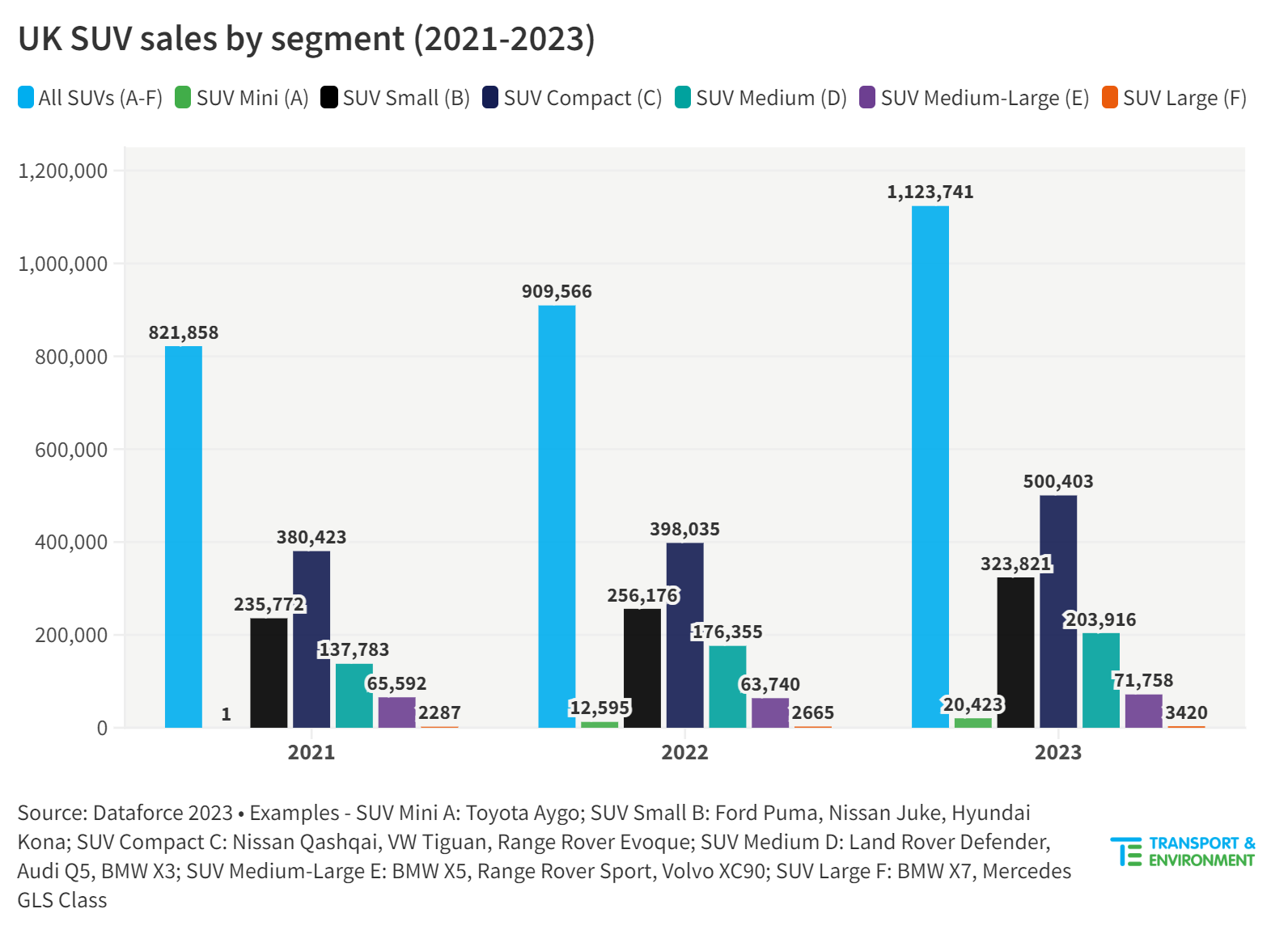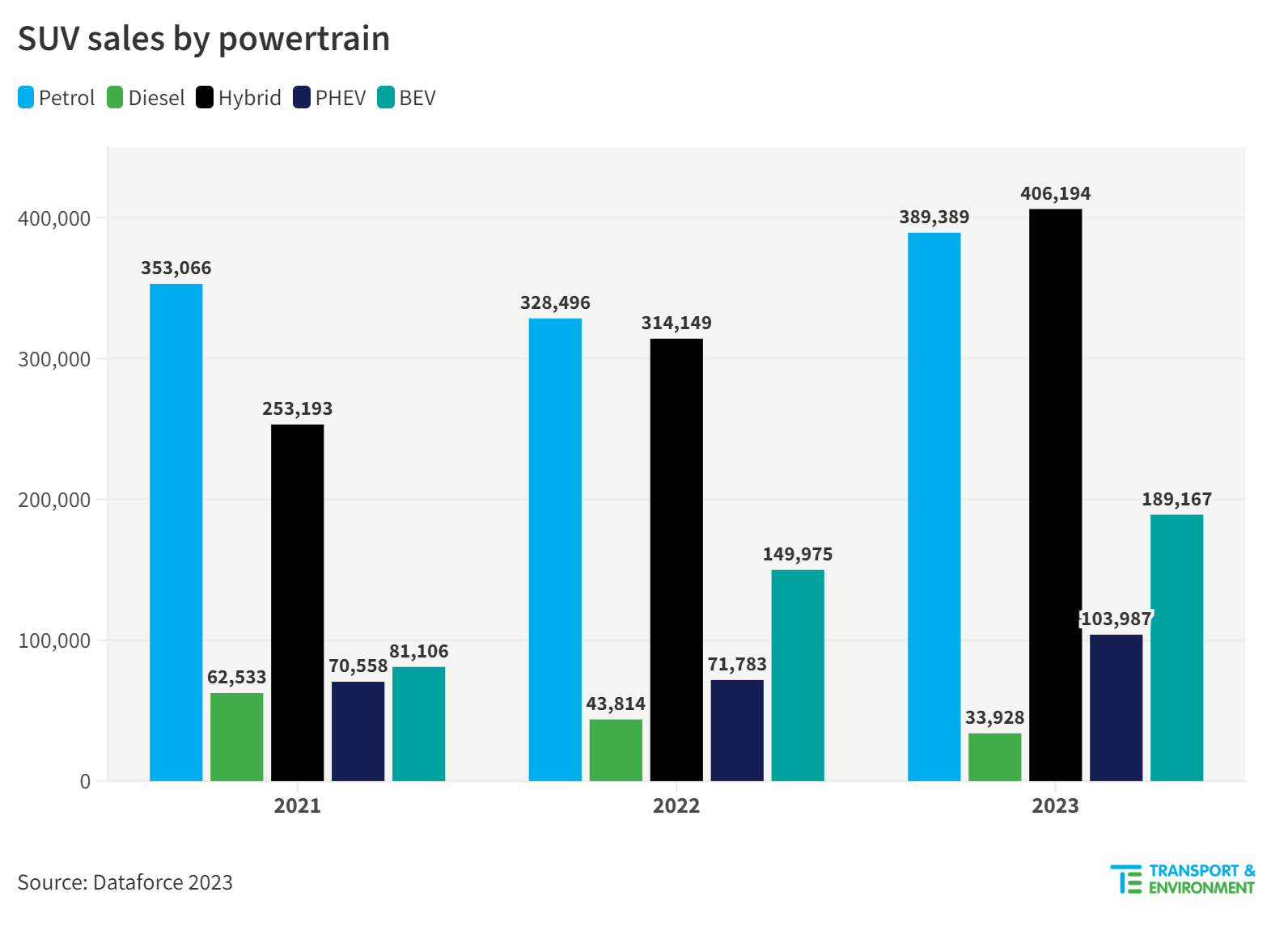New analysis from Transport & Environment UK has found that SUV sales in the UK have increased by 23% since 2022. In 2022 the number of new SUVs registered stood at 910k and were but now that number has grown by a third and stands at 1.12M.

In 2021 50% of all new car registrations were SUVs, in 2022 that figure stood at 57% and in 2023 that rose again to 60%. If the trend continues then in 2027 SUV registrations could make up 75% of new registrations.
Such high numbers of SUV registrations would blow a hole in UK carbon budgets as the vast majority, 83% in fact, of these SUVs are petrol and diesel cars, hybrids, or plug-in hybrids (PHEVs) meaning they are producing significant carbon emissions and will continue to do so as they remain a higher proportion of vehicles on the UK’s roads over the next 15 years.

The increase in the overall number of SUVs and the larger share of cars sold altogether is raising alarm bells as the UK’s roads are being squeezed for space, leaving other road users with significant safety concerns, and the considerable air pollution from SUV tyres.
This comes after Transport & Environment analysis last month showed that cars across Europe and the UK are growing, on average, by 1cm every two years, with UK cars being wider than the European average.
In order to address the growth of the size of cars on the UK’s roads, T&E UK is calling on car companies to prioritise smaller, more affordable electric cars and for the government to introduce weight-based taxes on the purchase of the heaviest new cars, as well as introducing a strict vehicle width limit to come into force by 2030.
Ralph Palmer, UK Electric Vehicle and Fleets Officer at Transport & Environment, said:
“SUV sales in the UK growing by more than a third in just two years is a dangerous trend that could spell disaster for the UK’s carbon budgets. The stubbornly high levels of polluting SUV sales is not only negating emissions savings from the move to battery electric vehicles, it’s embedding a culture of large, luxury cars, which is simply unsustainable. Carmakers, and the government, need to prioritise and support the production and sales of smaller, more affordable battery electric vehicles. That will ensure there are more mass market options available to British drivers so we can further progress on net zero targets.”
Sarah Rowe for the Clean Cities Campaign in Manchester, said:
“I’m worried this trend for bigger cars means we’ll simply run out of space for things we actually need; more green space to relax in, safer spaces to walk and cycle and public space for communities to thrive.Air pollution and traffic is a serious problem in our cities and this trend of bigger cars will only make it worse. Just last week Parisians voted in favour of curbing SUVs and I think this shows us that people want to see action before it’s too late.”
ENDS
Notes to editors:
If you would like to speak to a spokesperson or have any questions, please contact Alexander Killeen via alexander.killeen@transportenvironment.org or on 07806431577.
- Datasets used to produce the graph as well as the graphs themselves can be found HERE.
- Transport & Environment UK is the UK national office of green transport NGO Transport & Environment whose aim is to achieve a zero-emission mobility system that is affordable and has minimal impacts on our health, climate and environment and is accessible to all.
- The UK’s Climate Change Committee’s (CCC) 2023 Progress Report to Parliament stated the UK is off track on reducing emissions from new internal combustion engine car CO2 intensity, with a marked increase from 2019 where average gCO2/km has risen from 121gCO2/km to 130gCO2/km in 2022. According to the CCC, “improvements in engine technologies are being offset by trends towards larger vehicle sizes… current trends are moving in the wrong direction”.
- The segments included in this analysis are SUV Mini A, SUV Small B, SUV Compact C, SUV Medium D, SUV Medium-Large E and SUV Large F. Examples of vehicles for each segment include:
- SUV Mini A: Toyota Aygo
- SUV Small B: Ford Puma, Nissan Juke, Hyundai Kona
- SUV Compact C: Nissan Qashqai, VW Tiguan, Range Rover Evoque
- SUV Medium D: Land Rover Defender, Audi Q5, BMW X3
- SUV Medium-Large E: BMW X5, Range Rover Sport, Volvo XC90
- SUV Large F: BMW X7, Mercedes GLS Class


